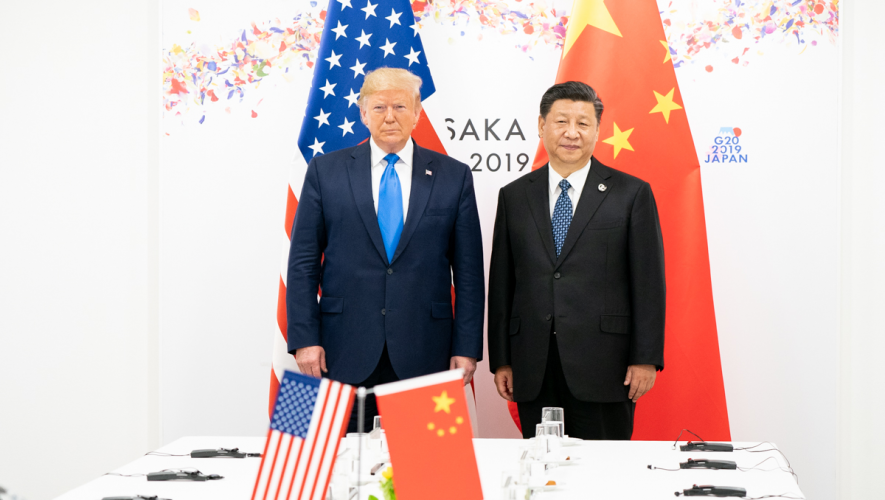In April, the National Republican Senatorial Committee (NRSC) distributed a fifty-seven page memo titled, “Corona Big Book.” Its message was simple.
“China caused this pandemic by covering it up, lying, and hoarding the world’s supply of medical equipment,” the memo reads. “China is an adversary that has stolen millions of American jobs, sent fentanyl to the United States, and they send religious minorities to concentration camps.”
Finally, the memo instructs, “don’t defend Trump . . . ”
The memo is a playbook Republicans can use for messaging wars in Senate battleground states. It offers an appealing solution for campaigns scared of acknowledging President Trump’s widely unpopular pandemic response, shifting Senate elections from a referendum on him to one on China.
“The NRSC’s ‘blame China’ strategy appears, at best, a last-ditch effort to redirect attention from COVID-19 and Trump’s well-documented failures to mitigate its spread.”
In a critical election year, Trump’s approval rating continues to slip, and with it, so do the reelection chances of Republican senators nationwide. Suddenly, Democratic strategists believe they can retake the upper chamber, despite the inherent disadvantages they face in doing so.
Republican strategists believe they’ve found a way to evade a Trump referendum and retain control of the Senate by blaming China for the pandemic and unleashing an anti-China platform. The strategy seems strong on paper, but it opens up counterplay for Democrats and fails to combat the reuse of the health care message that led them to midterm success in 2018.
Polling suggests an anti-China strategy has real heft. Since the start of the pandemic, American opinions on China have plummeted. July polling found that 73 percent of Americans held negative views of China, including 83 percent of Republicans and 68 percent of Democrats. Similarly, May polling found that 73 percent of Americans—80 percent of Republicans and 71 percent of Democrats—viewed China as either “very” or “somewhat” responsible for American COVID-19 deaths. China’s growing military power and cyber attacks concern at least 84 percent of voters, and at least 71 percent of voters support tough-on-China trade policies and domestic manufacturing.
An anti-China message puts these widely held opinions to work, allowing Republican candidates to effectively speak about COVID-19 without blaming Trump and Republican leadership, while also opening airspace for a full suite of other popular China stances. The hope is that China becomes a wedge issue, that candidates’ positions are viewed as tough or weak, and that they are seen as either prioritizing America or ceding global leadership.
But by tapping voter concern about different Chinese actions, Democrats can market their own tough-on-China stances and prevent Republicans from dominating the issue. A March poll found that 91 percent of voters were concerned about China’s impact on the global environment, 82 percent were concerned about its human rights policies, and 87 percent felt threatened by Chinese cyberattacks. Democrats can point to their congressional agenda, in which leadership prioritizes legislation that would reward companies for not outsourcing labor to China.
Yet, such a tough-on-China platform has its downsides. In April, Joe Biden drew substantial criticism from the left for an ad presenting Trump as overly willing to accept Chinese rhetoric on the outbreak. Progressives characterized the ad as jingoistic fear-mongering.
Even if Democrats take a tough-on-China stance, they should not blame China like Biden did. Blame should remain firmly on the shoulders of the Trump administration, especially since NRSC campaigns have diligently followed instructions not to push back on criticism of Trump’s outbreak response.
Trump’s inconsistency on both the scope of the outbreak and China’s role should boost Democrats. For months, the White House downplayed the threat of the virus, spouted misinformation, and delayed mitigation efforts. Since the US hit one hundred thousand virus deaths, public opinion on Trump’s outbreak response has dropped steadily. An August poll found only 38 percent of Americans approve of Trump’s response. On China’s outbreak response, he repeatedly flipped from cushy admiration to hawkish criticism.
Of course, Democrats should continue to promise a protected and expanded Affordable Care Act (ACA) as they did in 2018. A March poll found that 88 percent of voters placed health care as either “very” or “somewhat” important to their vote. Per a strategy memo released in May, Democratic leadership sees health care as the preeminent issue among all voters. And as COVID-19 spread, enrollment in the Democrat-championed ACA rose.
Despite the ACA’s popularity, Republican lawmakers and the Trump administration have tried to obstruct and remove it during a pandemic, compounding similar attempts made in 2017. In June, House Democrats passed an expansion to the ACA along mostly party lines. Republican senators have yet to comment on the bill’s future; pundits expect it to die on the Senate floor. The bill arrived in the Senate just days after the Trump administration published a legal brief urging the Supreme Court to strike down the ACA and remove coverage for up to twenty-three million Americans.
The NRSC’s “blame China” strategy appears, at best, a last-ditch effort to redirect attention from COVID-19 and Trump’s well-documented failures to mitigate its spread. Despite the memo’s April release, Republicans have yet to see any real polling gains and have instead lost ground as the pandemic ravages the country.
Moreover, the envisioned messaging “wedge” has failed to materialize. While Democratic Senate campaigns have yet to fully unleash their election ad blitzes, they have paid little attention to China so far. Other than the odd hit piece published in left-leaning outlets, Democratic campaigns and their surrogates have focused elsewhere.
The Republican “blame China” strategy struggles to redirect blame and does nothing to address the impact of the virus on American lives. Health care and economic resurgence win elections—hawkish blame-shifting does not.



